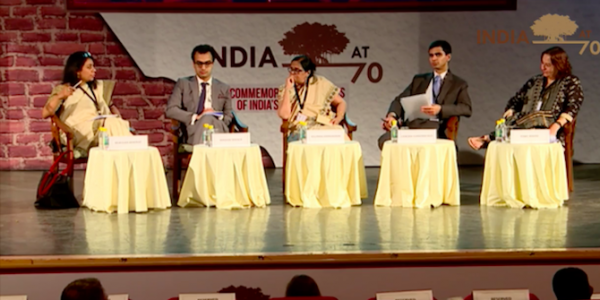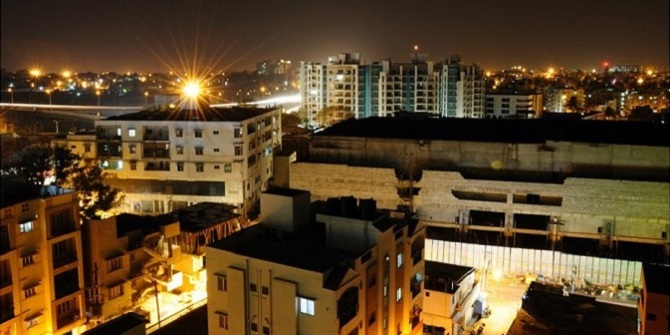Harish Alagappa and Sonali Campion report from the second day of India @ 70: LSE India Summit 2017, which saw an engaging panel that featured some of India’s leading legal experts explore the history and future of the longest written constitution in the world.
Speaking from her years of experience documenting and fighting injustice, Kalpana Kannabiran, Director of the Hyderabad Council for Social Development, introduced the constitution as a text for public education, in which ideas for social transformation are embedded. She expounded on the freedoms guaranteed by the constitution, but which have not been fully realised. Discussing the ways in which discrimination plays itself out, she highlighted recent incidents of violence and protests at numerous Indian universities, and explained that increasingly draconian beef bans are a violation of the constitutional freedoms of non-Brahmin Hindus: ‘what you eat is a part of a culture and is an intrinsic part of who you are’. Professor Kannabiran raised the question of how the ideal of non-discrimination could be entrenched in institutions funded by the state, and praised Indian Vice-President Hamid Ansari for his statements affirming the right of university students to express dissent against the Indian state.
Additional Solicitor-General of India Pinky Anand explained that ‘in spirit, the Indian constitution is native.’ She described how there have been numerous ‘variations and adaptations from time to time’ in the Indian constitution, underlining how ‘rights that weren’t drafted in the constitution were derived from it by the Indian judiciary.’ A former Head of the BJP’s All-India Legal Cell, Anand stated that constitutionally enforced patriotism ‘emerges from a dark age of recent history and possibly would not be in cognisance with fundamental rights.’ While questioning the effectiveness of the constitution over the course of the last 70 years, particularly its inability to stem corruption, Anand suggested that a flaw in the drafting of the document was ‘the constitution didn’t take into account human fallibility.’ She also believed that, ‘it is high time we got away from the concept of rights and focused on the concept of duties’.

Chintan Chandrachud, an Associate at the leading London law firm of Quinn Emanuel Urquhart & Sullivan, reflected on the fact that ‘the constitution has changed, is changing, and will continue to change in time, whether we like it all not’ as evidenced by Supreme Court (SC) judgements on election case law, for example the implementation of the option of NOTA (None Of The Above) in election machines, allowing the Indian electorate to express a protest vote and reject all political candidates on offer. More recently, the SC’s January 2017 ruling banning political parties from campaigning on platforms of religion and caste in elections as an example of updates to the Indian constitution that would reflect the issues of the time. However he did note that, ‘the court uses the language of purity and pollution, which is best avoided,’ as he believed it sat uncomfortably with the idea of the equality of all citizens.
Although many SC judgements are necessary, Chandrachud expressed concerns over the SC extending its reach beyond insisting on greater transparency (e.g. the disclosure of candidate backgrounds etc.) to change conceptions of citizenship more generally. He argued this is disconcerting for a number of reasons, firstly because they are symptomatic of the Court’s attempt ‘to fulfil this conception of being a sentinel of democracy’, suggesting that it knows the ‘correct’ way that elections should function and the electoral process must be modified to reflect that. He noted that in recent judgements ‘the Court uses the language of purity and pollution, which is best avoided,’ as he believed it evokes casteist language which sits uncomfortably with the idea of the equality of all citizens.
Madhav Khosla, the inaugural BR Ambedkar Academic Fellow at Columbia Law School and a doctoral student in political theory at Harvard University, believed that ‘no constitution will create the conditions for its own success or failure.’ He argued that this will depend on factors external to the text, and the degree to which these are committed to the enterprise. In this context, he emphasised India’s problems are not derived from the constitutional text, and warned ‘we think we can legislate ourselves out of our problems, but we can’t’.
Khosla went on to highlight that India is unique because it was the first country to democratise and make a constitution in a setting that is viewed by political theorists as unfit for democracy. The fact that the constitution has survived for over 67 years is thus a success story in itself, and he cautioned against tampering excessively with the framework of the country.
The extended question and answer session covered issues around the right to protest and privacy, and constitutional morality. The nature of political dissent and enforced patriotism was investigated in the context of incidents at university campuses in Pune, Kolkata, Varanasi, and most recently at Delhi University’s Ramjas College, where students protesting against the government and social structures that oppress women were physically assaulted by the student wing of the BJP. The session’s moderator, Associate Professor of Anthropology at LSE and founding Director of the LSE South Asia Centre, Mukulika Banerjee, opined that ‘the reason why Ramjas captured the imagination so widely was because there wasn’t an academic debate. The anticipation of a clash of views required a protest and then a demonstration takes place which is stopped with violence and inaction of the state – it was the coming together of all of those factors.’
Other hot-button issues in the discussion were attacks on the civil liberties of non-Brahmin Hindus by banning beef and attacking restaurants and meat shops, vigilantism and moral policing by right-wing fundamentalist organisations, judicial and electoral reform in India and the recent spate of racist attacks on Nigerian and other African immigrants in the suburbs of Delhi.
Dr Banerjee drew the discussion to a close by emphasising the need to engage with worrying ideas as much as those that we agree with, noting that the idea for the panel had been sparked by an interview with former BJP General Secretary K. N. Govindacharya in The Wire and his view that the constitution needed to be reframed to reflect ‘Bharatiyata’ (loosely translated as Indian-ness, though with connotations of a Hindutva idea of India). Addressing this debate, Anand reiterated that the constitution is already ‘native’, without need for drastic amendment to make it more Indian. Professor Kannabiran built on this, arguing that the text already set out the non-negotiables that formed the foundations of what it is to be Indian. Chandrachud underlined the fact the constitution was solemnised with the words ‘We, the People of India’ is significant in and of itself, because it makes the statement that it did not grow as an off-shoot from the British following independence but it grew from the Indian people in and of themselves. Khosla rejected the cultural essentialism contained within Govindacharya’s perspective, arguing the constitution is cosmopolitan ‘in the deep sense of the term’ because it drew on such a wide range of influences, so even to ask if the constitution is ‘Indian’ or not is to miss the point.
India @ 70: LSE India Summit 2017 ran from 29-31 March 2017. Videos of all panels are available on our Facebook, and video and podcast interviews with panellists will be available on the South Asia Centre website soon.
About the Authors
 Harish Alagappa is a writer signed with the Asia Literary Agency and is currently working on his first book. He was formerly an Assistant Editor with the New Delhi-based think tank, TERI (The Energy and Resources Institute), and has written for The Times of India, The Encyclopedia of Energy, The Score Magazine, and Sportskeeda. In his spare time, he’s an amateur stand-up comic, quiz enthusiast, and Radiohead aficionado. He tweets @chaosverse.
Harish Alagappa is a writer signed with the Asia Literary Agency and is currently working on his first book. He was formerly an Assistant Editor with the New Delhi-based think tank, TERI (The Energy and Resources Institute), and has written for The Times of India, The Encyclopedia of Energy, The Score Magazine, and Sportskeeda. In his spare time, he’s an amateur stand-up comic, quiz enthusiast, and Radiohead aficionado. He tweets @chaosverse.
 Sonali Campion is Communications and Events Officer at the South Asia Centre. She holds a BA (Hons) in History from the University of Oxford and an MSc in Comparative Politics from LSE. She tweets @sonalijcampion.
Sonali Campion is Communications and Events Officer at the South Asia Centre. She holds a BA (Hons) in History from the University of Oxford and an MSc in Comparative Politics from LSE. She tweets @sonalijcampion.







